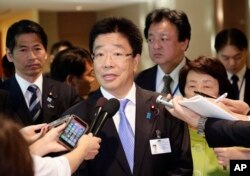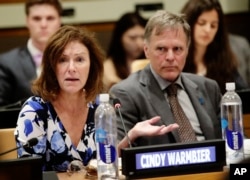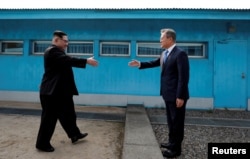As preparations are being made for the U.S. president and North Korea's leader to hold an historic summit, activists and academics are urging Donald Trump not to sacrifice human rights to achieve denuclearization.
"To date, attention had been paid to the threat against peace, such as nuclear testing and missile launches by the North Koreans, but we must not forget the abduction issue, where peoples' lives are under threat," said Koichiro Iizuka, a Japanese citizen whose mother was taken to North Korea when he was a baby. "It cannot be that the weight of human life is less heavy than nuclear weapons and missiles," he told a U.N. meeting Thursday on the abduction issue.
"In the context of the U.S.-North Korea upcoming summit, it is important that the U.S. raise the issue of abduction and entice actual action from North Korea," said Katsunobu Kato, Japan's minister in charge of the abduction issue.
Japan says 17 of its citizens have been abducted by North Korea and counts some 800 cases where the possibility of abduction by Pyongyang cannot be ruled out. Abductions are a sensitive and important political issue in Japan.
"This is an extremely urgent issue that needs to be resolved," Kato said.
Decades of pain
The abduction issue has haunted some Japanese families for decades.
Koichiro Iizuka was only one-year-old when his mother was abducted in 1978 by North Korean agents.
"I am without any memories of my mother," the now 41-year old said.
At a summit between the leaders of North Korea and Japan in 2002, his family first received information on his mother. The North Koreans said she had died in a traffic accident.
"There are no words to describe how I felt back then, the only thing I can say is that endlessly tears dropped from my eyes," Iizuka told the meeting.
But Iizuka says further investigation found that the death certificate was a fake and there was no information to confirm his mother's death.
"She is still alive in North Korea; she is still waiting there to be saved," he said.
For Takuya Yokota, the 1977 abduction of his then 13-year old sister on her way home from school continues to cause his family heartache.
"My parents spent more than 20 years without knowing what had happened to her," Yokota said.
His family was told by Pyongyang officials in 2002 that his sister was dead that she had committed suicide. Remains were returned, but subsequent DNA testing proved they were not his sister.
"After all these decades of suffering and distress that North Korea imposed on us, they piled further despair on us," Yokota said. "The issue of North Korea is not only nuclear development and missiles, but the abduction matter must not be forgotten."
"The near total absence of human rights concerns from the agenda of the inter-Korean summit meeting was a missed opportunity," Junya Nishino, a professor at Tokyo's Keio University said of last month's historic meeting between the leaders of North and South Korea. "It is imperative that human rights are not sidelined in any talks," he added.
U.S. detainees
North Korea is also holding three U.S. citizens, who the Trump administration has indicated could be released imminently.
But another detainee, American student Otto Warmbier, was not so fortunate. The 21-year old was arrested in North Korea in January 2016 for stealing a propaganda poster and sentenced to 15 years in prison.
He died in June 2017, days after he was released and returned to the U.S. with severe brain damage.
"First, we were silenced by North Korea, we were afraid to say anything," Otto's father Fred Warmbier recounted. "We lived in fear, and fear of what they would do to our son. So they used him as political pawn for as long as they could. When he was of no value to them, they essentially sent him home to our family in a body bag."
The Warmbiers filed a lawsuit last week in a U.S. district court seeking compensation for their son's death. Warmbier said the suit seeks to construct a narrative of the events that occurred while Otto was detained.
"We are trying to build a pathway that leads directly to [leader] Kim [Jong Un] and his regime to force them to be answerable for their actions," he said.
Cautious negotiations
North Korea experts are urging the Trump administration to tread carefully at the expected summit.
"We should not be optimistic about recent developments and also should keep a cautious eye on the North Korean leader's words and behaviors," said Professor Nishino of Keio University. "The North Korean leader has expressed his willingness to achieve a nuclear-free Korean peninsula, but any specific measures for denuclearization of North Korea were not mentioned in the Panmunjeom declaration last month," he noted. He said that at the U.S.-North Korea summit the leaders must deliver a detailed agreement on how North Korea will denuclearize.
Jonathan Pollard of the Washington-based Brookings Institution wonders why this outreach from Kim now and what is he seeking.
"He sees this as time to chip away at the coalition that has been arrayed against North Korea," Pollard said. "To erode America's alliances to the Republic of Korea and Japan, and to push through a door that the progressive president of the Republic of Korea, President Moon, has opened for him."
Pollard points out that so far all Kim has offered the international community are gestures, ones that have little or no cost for him, such as halting nuclear and long-range missile tests. He says President Trump must be ready to disabuse Kim of the notion that nuclear weapons guarantee his regime's survival.
"A murderous tyrant may don the clock of compliance, a sunny disposition, and dupe the world, but he is still a murderous tyrant," said Sung-Yoon Lee, of Tufts University's Fletcher School. "We have to keep up the pressure on North Korea, and remind the world of the basic nature of the North Korean regime cruel purveyors of inhumanity."








